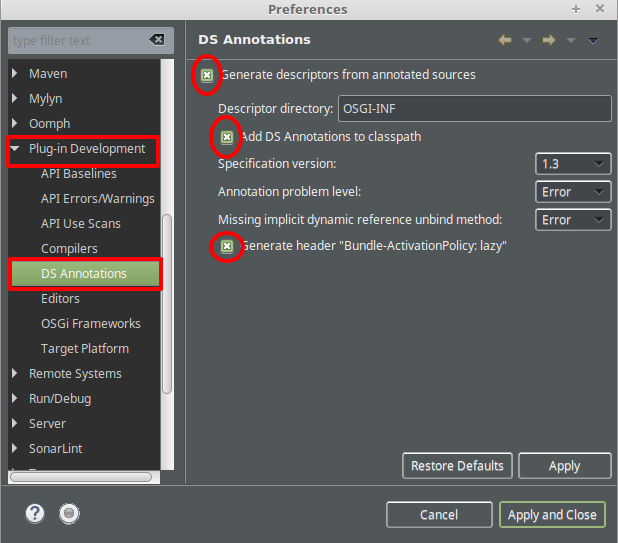Ditch XML: Declare Service Annotations and Simplify Plug-in Development
This guide explains how to use OSGi Declarative Service (DS) annotations to simplify plug-in development by eliminating the need for XML configuration. By leveraging DS annotations, you can optimize your development process and improve maintainability.
📖 Reference Links
- Improvements in Declarative Services from Eclipse Oxygen
- OSGi Declarative Services Annotations Documentation
- Vogella Blog on OSGi Declarative Services
Eclipse has also modified the Felix SCR (Service Component Runtime) to make the API documentation more precise. You can find additional details in the Eclipse documentation.
🛠️ How to Use DS Annotations
1. Eclipse Version
Ensure you are using Eclipse Oxygen or a newer version.
2. Configure Eclipse for DS Annotations
Set up Eclipse to support DS annotations:
- Go to
Window > Preferences > Plug-in Development > DS Annotations. - Configure the settings as shown in the image below:

3. Update Your Plug-in Manifest
Add the following package to the Import-Package section of your plug-in's MANIFEST.MF file:
org.osgi.service.component.annotations
Service Factory
For factory classes, add an annotation like the one below:
Sample Code
@Component(
property = {"service.ranking:Integer=2"},
service = org.adempiere.base.IProcessFactory.class
)
public class JRProcessFactory implements IProcessFactory {
// Implementation here
}
- You don't need to declare a service if you directly implement a service interface like
IProcessFactory. - For array properties, repeat the property name for each value.
Event Handler
For event handler classes that extend from AbstractEventHandler, add an annotation like the one below:
Sample Code
@Component(
reference = @Reference(
name = "IEventManager",
bind = "bindEventManager",
unbind = "unbindEventManager",
policy = ReferencePolicy.STATIC,
cardinality = ReferenceCardinality.MANDATORY,
service = IEventManager.class
)
)
public class SampleEventHandler extends AbstractEventHandler {
// Implementation here
}
By using DS annotations, you can eliminate the need for XML configuration, making your plug-in development process faster and more efficient.